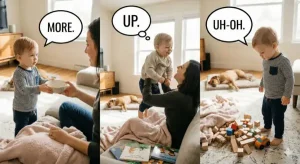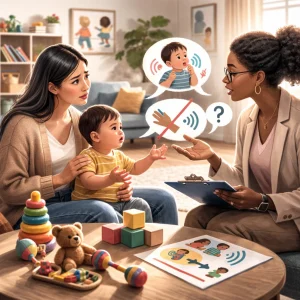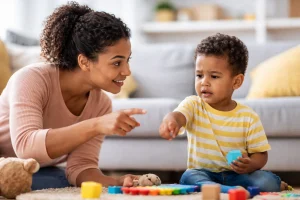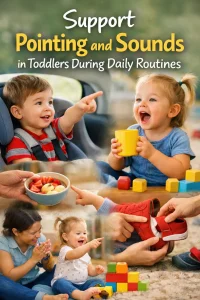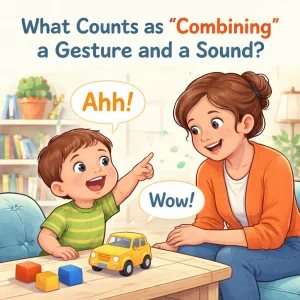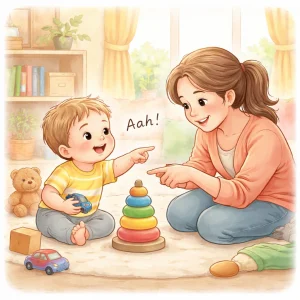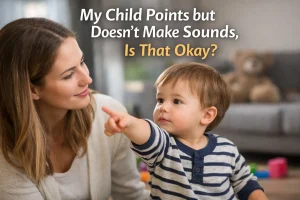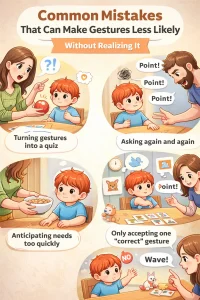7 Fun Speech Activities for 18–24 Month Olds to Boost Talking and Vocabulary
Last Updated: September 2, 2025
If your toddler is between 18 to 24 months old, you might be wondering how to help them start talking more. The good news? You don’t need fancy tools or strict lessons. Just a few simple, playful activities each day can do wonders for your child’s speech and language development.
At this age, toddlers are busy exploring the world. They learn best through play, repetition, and meaningful interactions with you. Whether you’re naming everyday items, reading a favorite book, or singing a silly song—these small moments help build their vocabulary and confidence to speak.
Free Speech Help for Kids
Concerned about speech delays? Book a free consultation with our expert speech therapist and get guidance tailored to your child’s needs.
7 Therapist-Approved Speech Activities for Toddlers
1. Talk During Daily Routines
Everyday moments are perfect for helping your toddler learn new words. Whether you’re getting dressed, cooking dinner, or going for a walk, talk about what you’re doing. Say things like “Let’s put on your socks” or “I’m cutting the apple.”
By naming objects and actions, you’re helping your child connect words with meaning. These daily speech routines don’t require extra time—they simply turn normal activities into powerful language-building moments. This is one of the easiest and most natural activities to help your toddler talk.
2. Read Simple Books with Repetition
Books with short, repeating phrases are great for speech development. Toddlers love hearing the same words over and over—it helps them remember and try saying them. Choose books with simple pictures and predictable lines, like “Brown Bear, Brown Bear, What Do You See?” or “Dear Zoo.”
Reading just 5–10 minutes a day can make a big difference. It teaches your child how to listen, understand, and copy sounds. These are the basics of how to build toddler vocabulary in a fun and relaxed way. You can find more reading ideas in our speech tips for parents guide.
Pro tip: Let your child turn the pages and point to pictures. Pause and wait to see if they try to say a word!
Also read: 6 Best Children’s Books for Speech & Language Growth
3. Sing Songs and Rhymes Together
Songs and nursery rhymes are not just fun—they’re also amazing tools for speech. The rhythm and repetition in songs like “Twinkle Twinkle” or “Wheels on the Bus” help toddlers remember words and phrases.
Singing builds speech memory, improves listening, and teaches new words through music. Add actions with your hands, like clapping or pointing, to make it even more engaging. These songs for speech development are easy to do anywhere—bath time, car rides, or bedtime.
Know more: Benefits of Using Music and Songs to Boost Speech Articulation
4. Use Short and Clear Phrases
When talking to your toddler, keep it simple. Use short, clear sentences like “More juice?” or “Look, dog!” Speaking slowly and clearly gives your child a better chance to listen, understand, and repeat.
Avoid correcting grammar or pushing for perfect words. Just model how to say things naturally and wait. This gentle approach is key to speech therapy at home for toddlers, especially if they’re just starting to say words.
Keep the tone warm and encouraging. Your toddler learns best when they feel safe and not rushed.
5. Let Your Child Choose and Lead Play
Toddlers love when they get to decide what to play with. Let your child pick the toy or activity, and follow their lead. If they grab a toy car, you can say, “Go car!” or “Vroom!”
By giving them choices, you’re boosting their confidence and helping them express what they like. This kind of toddler-led play for language encourages more natural talking and connection. Games like pretend cooking or building blocks are great speech-building games.
6. Repeat and Expand What Your Child Says
One of the most powerful things you can do is repeat your child’s words—and then add a little more. For example, if your toddler says “ball,” you can say, “Yes, big red ball!” This helps them hear new words while feeling understood.
This simple technique is called language expansion, and it teaches toddlers how to build longer phrases over time. It’s one of the easiest ways to help your toddler talk more, especially during play or story time.
Don’t force it—just follow their lead and make it part of your daily conversations.
Read more: Why Kids Repeat Words or Phrases & How to Help
7. Use Toys That Spark Talking
Some toys naturally invite more talking. Think pretend food, animals, toy phones, or vehicles. These give you a chance to name things, ask questions, and act out fun scenes.
For example, pretend play with a kitchen set lets you say things like “Stir the soup” or “More juice, please!” This kind of speech-building play keeps your toddler engaged while they learn new words.
Conclusion
Helping your toddler learn to talk doesn’t have to feel like “therapy time.” It can happen in the middle of play, story time, or even while brushing teeth. Simple, fun, everyday interactions are what build strong speech and language skills between 18 and 24 months. By talking through routines, reading repetitive books, singing, modeling short phrases, expanding on their words, and letting them lead play, you’re giving your child a foundation for confident communication.
Frequently Asked Questions:
1. How can I help my 18-month-old start talking more?
You can help by talking during daily routines, reading simple books, and singing songs. Everyday activities are the best way to build toddler speech and language.
2. What are fun speech activities for a 2-year-old?
Play pretend games, use toy animals or food, sing rhymes, and let your child lead play. These activities make learning new words fun and natural.
3. Should I correct my toddler’s speech mistakes?
No, don’t correct or force them. Instead, repeat their word correctly in a simple phrase. For example, if they say “car,” you can say, “Yes, red car.”
4. How many words should an 18-month-old say?
Most 18-month-olds say about 10–20 words. By 24 months, many toddlers may use 50 words or start combining two words like “more juice.”
5. Can singing songs help with toddler speech development?
Yes! Nursery rhymes and songs build memory, rhythm, and vocabulary. Singing with actions makes it even easier for toddlers to copy and learn new words.
6. What are the best books for toddlers with speech delay?
Books with simple pictures and repeating lines, like Brown Bear, Brown Bear or Dear Zoo, are great for toddler speech development.
7. How do I know if my toddler’s speech is delayed?
If your toddler has fewer than 20 words by 18 months or fewer than 50 words by 2 years, or if they are not trying to imitate sounds, it may be a speech delay.
8. Can everyday routines really help speech?
Yes! Talking about socks, apples, baths, or walks connects words with meaning. Speech development activities at home don’t need extra time—just daily talk.
9. When should I worry about my toddler not talking?
If your 2-year-old is not saying at least a few words or doesn’t respond to simple instructions, talk to your pediatrician or a speech therapist.
10. What toys are best for speech development in toddlers?
Pretend play toys like kitchen sets, animal figures, toy phones, and cars are great for speech. They create chances to name, ask, and act out words.
About the Author:
Anuradha Karanam
Speech-language pathologist (7+ years of experience)
Anuradha Karanam is a skilled speech-language pathologist with over 6 years of experience. Fluent in Tamil, Telugu, Hindi, and English, she specializes in parent counseling, speech sound disorders, fluency assessment, and speech-language evaluations. Anuradha excels at working with children with developmental disorders, offering creative and effective therapy programs. Currently, at Wellness Hub, she holds a BASLP degree and is registered with the RCI (CRR No A85500). Her patience, ambition, and dedication make her a trusted expert in her field.
Book your Free Consultation Today
Parent/Caregiver Info:
Client’s Details:
* Error Message
